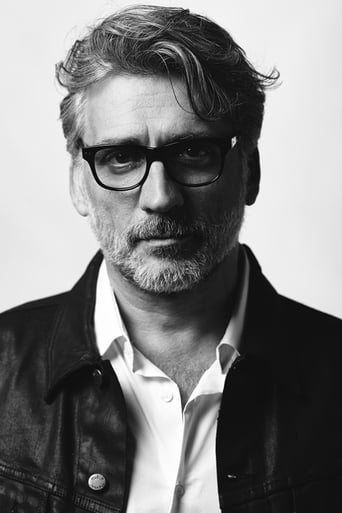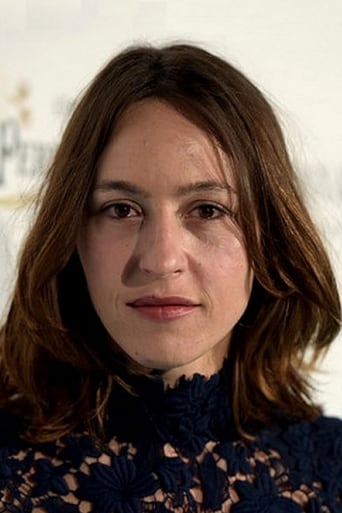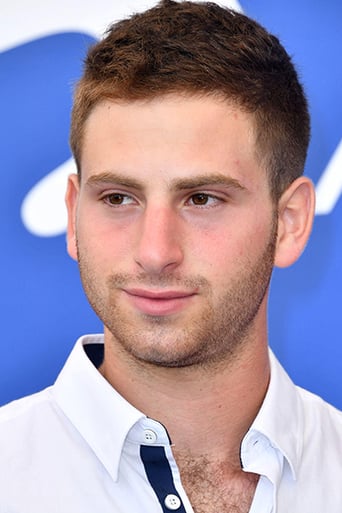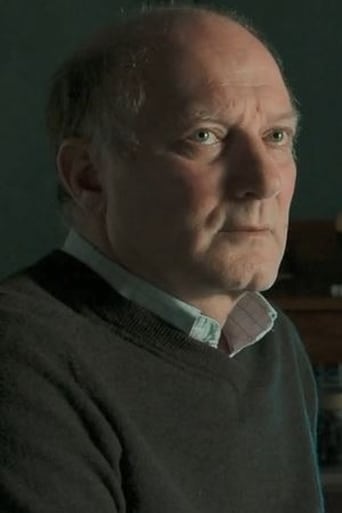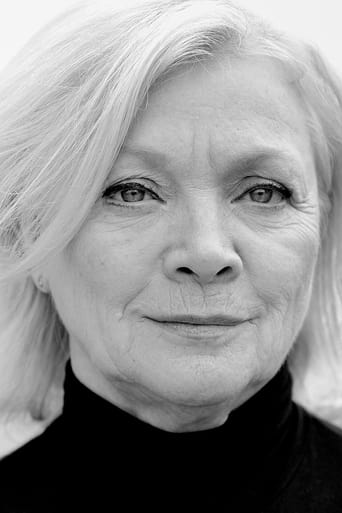Geraldine
The story, direction, characters, and writing/dialogue is akin to taking a tranquilizer shot to the neck, but everything else was so well done.
michaeldixon-56041
Https://dixonsbl0g.blogspot.com/2018/04/new-movie-review-foxtrot.htmlFoxtrot is an Israeli movie that begins as an analysis of grief and evolves into something much more. The opening scene shows Israeli soldiers informing a couple that their son has been killed in the line of duty. The film then begins to analyze the couples' reaction. This concept would be enough for most movies, but Foxtrot is not content to accept that a soldier's death is just a part of life. It yearns to discover the societal and familial causes that created this unnecessary tragedy.I don't want to give too much away, so I'll keep this brief. The movie evolves into a fascinatingly complex think piece that is better to witness than to hear second-hand. Yes, it's a study of grief, but it's also a satirical thesis on the pointlessness of war. It's an analysis of how an individual's flaws echo through generations. It points a finger at the "shoot first, ask questions later" policies of the police. It questions the religious traditions that hold together the fabric of society.All of these themes are studied in the context of the foxtrot - a dance that always ends in the same place that it began. The film comes to the beautifully depressing conclusion that none of these problems can be solved. Or at least that none of these problems have been solved, despite multiple generations living through them. No matter what we do, we always end up in the same place.
proud_luddite
Michael and Dafna Feldmann (Lior Ashkenazi and Sarah Adler) are a well-off Tel Aviv couple who have just received news that their young adult son was killed while on military duty.The narrative is told in three segments of equal length. The first exposes the family's reaction to the bad news; the second takes place in an isolated military checkpoint; the third returns to the Feldmann family home.Each segment has its own unique style. The first is much like the films of Ingmar Bergman with a lot of silent brooding, overhead shots, and many close-ups. It succeeds in exposing the physical toll of heartbreaking grief. There is also a fascinating scene involving a relative who has dementia. Its conclusion is, to say the least, shocking.The second segment seems dull in the beginning but this is likely deliberate as a way for the viewer to experience the lives of the four young soldiers at the checkpoint. They are living in terrible, secluded conditions with little happening in their daily routine. The dullness certainly ends in a couple of scenes near the end of this section - scenes which are a harsh critique of the Israeli military itself. The climactic conclusion of this segment is deliberately skipped and revealed only at the end via flashback.The final segment is the most fascinating. It leaves the viewer in the place of trying to understand what happened at the end of the second segment and the pieces gradually fit before the flashback scene in the epilogue. This segment also highlights the great acting talents of Ashkenazi and Adler whose ensemble is deeply touching especially during a moment of unexpected laughter.The talents of director/writer Samuel Maoz are on great display. In the most subtle of ways, he draws in the viewer to feel what the characters feel. And his screenplay is exemplary in its exposure of the wickedness of life and fate and for its very unique structure.OUTSTANDING ACHIEVEMENT: Screenplay by Samuel Maoz
maurice yacowar
The foxtrot - a happy, spirited dance - is here a metaphor for quite the contrary: the hopeless ritual in which Israelis and Palestinians find themselves locked. They take a step forward, a step sideways, then it's back to their starting point. Instead of progress there's stasis - a malevolent antagonism and paralysis.
With the macro dance not working, you seek comfort in the micro. You dance with your own, smoothing out differences and alienation so you can carry on. That's what Michael and his Dafna do at the end, overcoming their separation. The soldier's solitary dance with his rifle is the alternative to a couple or communal dance - solitary, masturbatory, an unconstructive indulgence.
In the national context, citizens adapt to each others' errors and transgressions. They remain united against their common mortal enemy. That's why the army here covers up the accidental murder of the carload of young Palestinians.
The film examines the moral cost of surviving in Israel's situation, besieged by a genocidal enemy. A mistaken identity can ruin a whole family of lives. The Feldmans fall into profound grief - till they learn the dead soldier is a stranger with their son's name.
We don't see the other Feldman family's pain, but we can guess it. Indeed, the army rabbi's visit here suggests how common these deaths are in Israel, how ritualized their procedure has become. An hourly phone call reminds the bereaved to drink a glass of water. This is the normalization of loss -and it carries a psychological and moral cost.
At the first death report Michael is buried in grief, frozen. In his sensitivity every sound registers loud: his body hitting a bed, the dog hammering the door to get in. In his repressed rage Michael kicks his pet, in impulsive anger that that life survived his son.
But the dog remains faithful, tentative in his returns but always coming back to him. Like the Israeli citizens persisting under attack, he bears his pain and carries on. But like the other Israelis, the dog is silently bleeding within.
Jonathan's actual death - on the trip home Michael insisted upon - splinters the parents' marriage. By now Michael has experienced enough grief to start handling it. He recovers his comfort, joy and marriage - by smoking weed with Dafna. That's the secular alternative to religious consolation.
In contrast, Michael's mother has slipped from her nervous breakdown into dementia. Her speaking German instead of Hebrew shows her rooted in her past. She claims to register Jonathan's death -- but then confuses Michael with his brother Avigdor.
The film shows a secular Israel. These Feldmans are non-observant. The story of trading the family heirloom Bible for a porn magazine handily conveys at least these Israelis abandoning religious tradition for the modern realities of life. As they face annihilation, pragmatism holds sway.
In that existential danger even something commonplace can have soul-wrenching consequences. Hence the three traffic accidents.
In the first Michael remains traumatized with unnecessary guilt for having sent another vehicle ahead of his own on the highway - to a mortal mine. That's the guilt hidden beneath the film's innocent opening shot. Only after he finally shares this secret with Dafna can they reconnect. He also feels responsible for his mother's breakdown.
Son Jonathan machine guns a car when he mistakes a dropped pop-can for a grenade. If he escapes man's justice, he's killed in an absurd traffic accident en route home. His death, by the way, is absurd enough to be read as divine justice.
When Jonathan draws a cartoon of the bulldozer hoisting the car (i.e., his guilt) to bury it, he's recording what his superiors have allowed him to keep secret. Dafna keeps the drawing, unaware of its implication. As Jonathan cartoons his father's Last Bedtime Story, a coming of age ritual, it's important that he include this personal admission of responsibility. There are plenty of justifications for not turning the accident into an international attack on the state fending off annihilation.
The use of background artworks shows the care in this film's realization. Dafna's fainting reveals the drawing behind her, a large layering of black squares jumbling into the distance. The emblem of order and stability - the square - here expresses a vertiginous confusion. A high angle shot then spins above Michael against a floor of geometric squares, similarly dizzying and unstable. When Dafna moves the painting into another room it hangs tilted, askew, compounding the instability of even the stable. Michael's den has another black and white abstract painting - a fuzzified horizon line that evokes an ECG.
Finally, Jonathan's secularity and sexual awakening are imaged in the washed out pinup girl face on the soldiers' metal barracks. Of course, that emblematic shed is sinking into the mire, endangering its young future.
The Israeli government hates this film because that impulsive murder scene might be taken to imply that such IDF errors are frequent not freakish. Or worse, deliberate. But the tensions from Israelis living under constant threat of attack, especially for a handful of young soldiers alone at a remote security point, makes Jonathan's impulse understandable.
Writer/director Samuel Moaz makes his focus the Israeli response to the Palestinian threat so he doesn't retell its history. The Palestinian citizenry here are themselves victims of the Palestinian assault against Israel - via Israels' defensive measures. Moaz's subject is the situation's challenge to the Israelis' moral compass. He's examining the Israeli's frozen foxtrot, not the Palestinians'. But the lesson holds for both partners not yet dancing together.
This film is an insightful, moving revelation. Its dramatic shifts in tone, with surprises and shock at every turn, make this an emotional roller-coaster.
But in framing out the Palestinian attack, in taking that context as understood not restated, the film may be read as suggesting that the Israeli moral compass causes the regional problem. Under existential threat what alternative does Israel have to hard security measures?
Where are the Palestinian films that question the genocidal campaign that has for a century prevented their peaceful coexistence? After all, it takes two even to foxtrot.
Finally, credit to Moaz's implicit revision of Chekov: A camel planted in Act 2 must go off in Act 5.


